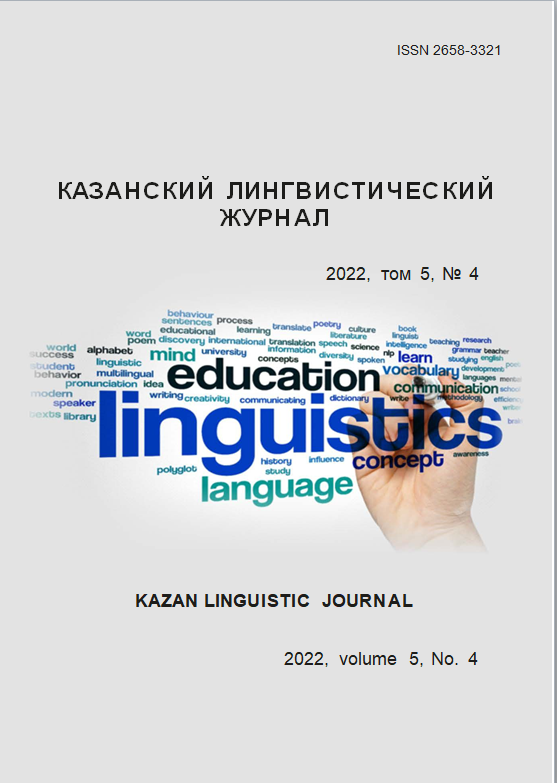Organization of the Conceptual Category Structure
https://doi.org/10.26907/2658-3321.2022.5.4.523-534
Keywords:
conceptual category, categorical concept, concept DOG, concept FOODAbstract
This article is devoted to the study of conceptual category structure. Conceptual category is an open formation that is able to include new elements. We view conceptual category as a category that has concepts as elements that are united by categorical concept. The size of the category depends on the social, cultural, historical, etc. significancy of the concept that forms the category. It is stated that conceptual category represents 3D system that consists of many layers. Each layer represents different aspects of the categorical concept and includes its own array of concepts. Some concepts of a layer can belong to other layers as well when actualize this or that feature. The layers reflect social, religious, technical, professional, poetic, etc aspects. The idea is proved on the example of the categories DOG and FOOD. The author views professional and cultural layers for DOG concept (the category includes such elements as FRIENS, EVIL, SUBMISSION, etc.), and poetic, advertising and religious layers for FOOD (the category includes such concepts as SERVISE, EVENT, TASTE, SMELL, DRINK, MEDICINE, etc.). Results of scientists that studied the above mentioned concepts are used to elicit the concepts that belong to the studied categories. Descriptive, semantical-cognitive methods and method of cognitive interpretation are used in the article.
References
References
Frumkina R.M. Colour, sense, similarity. Aspects of psycholinguistic analysis. Mos-cow: «Nauka»; 1984.
Kubryakova E.S. Short dictionary of cognitive terms. Moscow: MGU; 1997.
Taylor John R. Linguistic Categorization. Prototypes in Linguistic Theory. Clarendon Press. Oxford; 1995.
Maslova V.A. Cognitive linguistics. Minsk: TetraSystems; 2008.
Rosch E., Mervis C.B., Gray W.D., etal Basic objects in natural categories. Cognitive Psychology. 1976. Vol. 8: 382–439.
Lakoff J. Women, fire and dangerous things. What categories reveal about mind. Moscow: Languages of Slavic cultures; 2004.
Boldyrev N.N. Language and the system of knowledge. A cognitive theory of lan-guage. Moscow: Languages of Slavic cultures; 2018.
Kubryakova E.S. Language and knowledge. On the way to getting knowledge about language: Parts of speech from the cognitive point of view. Russian Academy of Sciences. Institute of Linguistics. Moscow: Languages of Slavic cultures; 2004.
Dziuba E.V. Lingvocognitive categorization in Russian language consciousness. Ural State pedagogical University. Ekaterinsburg; 2015.
Babenko L.G. Conceptosphere of the Russian language: key concepts and their rep-resentations (on the material of vocabulary, phraseology and paramiology). Ural State pedagogical University. Ekaterinsburg; 2010.
Makarova E.M., Radbil T.B., Ratsiburskaya L.V., etal Lingvocognitive aspects in synchrony and diachrony. Nizhny Novgorod: Lobachevsky State University of Nizhny Novgorod; 2020.
Borisenko T.V., Pitina S. A. Some specific features of conceptual category organi-zation (Based on Russian). Theoretical and Applied Linguistics. 2021. 7(3); 26–34. doi: 10.22250/2410¬7190_2021_7_3_26_34.
Demidova E.E. The development of cognitive signs of the TSAR concept in Russian linguoculture until the XIX century .Modern studies of social issues. Vol. 13 №3. 2021; 293–306. DOI: 10.12731/2077-1770-2021-13-3-293-306
Marugina N.I. The concept “DOG” as the element of the Russian language picture of the world. Yazyk I kultura; 2009. №2; 11–30.
Barsky M.A., Nazarova A.V. Concept “DOG” in the minds of military dog handlers and the civilian population. Yazyk I mezhkulturnaya kommunikatsia v sovremennykh usloviyakh. 2020; 23–25.
Sudina L.V. Features of the concept “FOOD” in advertising radio discourse. Bulletin of the North-Eastern Federal University. 2021 №2 (82); 70–81. DOI: 10.25587/h8240-0973-2794-p
Goncharova N.A. Religious worldview and its reflection in lexicography (on the ex-ample of the concept of “FOOD”). Bulletin of the Moscow State Linguistic University. 2014. №21 (707); 203–212.
Kurbanov I.A., Kuchkildina O.V. Linguocognitive and linguocultural peculiarities of concept FOOD representation in poetic, discourse in the Russian, English and German languages. Collection of scholarly reports. International conference “Fundamental and practical scientific studies: social, humanitarian, naturalistic and technical sciences”. 2014; 69–81.






